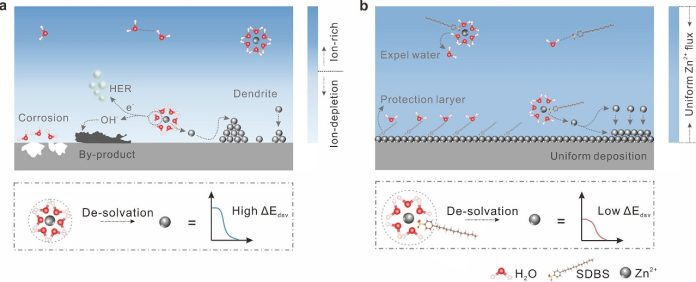
Researchers have developed a new method to make zinc-ion batteries more stable and longer-lasting.
This breakthrough, led by Professor Hu Linhua from Hefei Institutes of Physical Science of the Chinese Academy of Sciences, was published in the journal Energy Storage Materials.
The team focused on stabilizing the zinc anodes in aqueous zinc-ion batteries (AZIBs) by using special additives in the battery electrolyte.
AZIBs are known for their safety, reliability, and cost-effectiveness, but they face a major problem: zinc dendrite growth and side reactions, which reduce battery life and performance.
To address this, the researchers proposed using anionic surfactants, which have a history of preventing corrosion and improving zinc plating in metallurgy.
In their study, the team evaluated the highest occupied molecular orbital (HOMO) energy levels of various molecules.
This energy level is crucial for selecting the best anionic surfactant additives to stabilize the zinc anodes.
They chose three typical anionic surfactants: sodium dodecyl benzene sulfonate (SDBS), sodium dodecyl sulfonate (SDS), and sodium p-ethylbenzene sulfonate (SEBS).
The results showed that SDBS, with the highest HOMO energy level, had the strongest effect on stabilizing the zinc anode.
This additive prevented harmful zinc dendrites from forming, which are tiny, tree-like structures that can cause batteries to fail.
Dr. Li Zhaoqian, a member of the research team, explained that SDBS “can stop harmful zinc dendrites from growing and make the batteries better at being recharged and reused.”
The tests showed that batteries with SDBS worked well even after many cycles and at high power levels.
The researchers tested the batteries for over 3,200 hours, and they lasted 30 times longer than those with the original electrolyte.
They also built Zn//Cu batteries, which achieved an average Coulomb efficiency of 98.15% after 800 cycles. Another battery, Zn//NH4V4O10, showed long-term stability with 93.5% capacity retention after 8,000 cycles.
This new strategy provides a promising way to select the best electrolyte additives for high-performance AZIBs. It could also be applied to other types of metal batteries, potentially improving their stability and lifespan as well.
Overall, this research marks a significant step towards more efficient and durable zinc-ion batteries, which could play a crucial role in the future of renewable energy storage.



